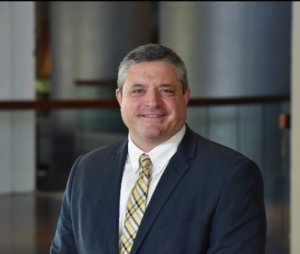The National Alliance to Stop Impaired Driving
By – Darrin Grondel
Vice President, Government Relations and Traffic Safety
Responsibility.org
On March 20, 2013, Thomas and Barbara Swift were tragically killed in upper Michigan State by a log truck driver who ran a red light striking their vehicle in the intersection, killing Thomas upon impact with Barbara succumbing to her injuries three days later. The causing driver was operating on a suspended license, no CDL, reportedly driving recklessly prior to the collision, and was under the influence of cannabis. Their son, Brian Swift, embarked on a journey of change to address impaired driving laws in his home state. Having worked in politics for many years, he formed a small coalition of key stakeholders who helped pass Michigan Public Act 242 and 243 in 2016, affectionately known as the Thomas and Barbara Swift Act. These two acts authorized a pilot study for law enforcement officers to use roadside oral fluid screening in five counties and a year later authorized use for all Michigan counties. The coalition was successful, and members wanted to expand their reach and capacity, hence the idea for the National Alliance to Stop Impaired Driving was born. Brian currently serves as the NASID spokesperson. Read more about Brian’s Story – National Alliance to Stop Impaired Driving (nasid.org)
The National Alliance to Stop Impaired Driving (NASID) is a broad coalition established and led by Responsibility.org to eliminate all forms of impaired driving, especially multiple substance impaired driving, through effective and proven measures such as DUI system reform, DUI detection, enhanced toxicology testing, and improved use of data and technology. Our members include a broad array of organizations dedicated to preventing impaired driving. Ron Replogle – MADD National Law Enforcement Initiatives Manager, currently serves on the NASID Board.
NASID provides national leadership in identifying and promoting solutions to impaired driving, including expanded chemical testing among impaired drivers, training for criminal justice practitioners, toxicology lab capacity, improvement and programs to increase the likelihood of recovery, and reductions in recidivism. Our work includes state and federal advocacy efforts, public awareness and education, and state implementation of effective programs. Multiple substance items in the most recent transportation authorization bill were advocated by NASID and its many partners.
Data Drives the Narrative
In traffic safety, data drives the narrative. Tragically fatal crashes in the US climbed to 42,915 in 2021, a 10.5% increase from 2020 and is the highest number of traffic fatalities in 16 years. Historically, police-reported, alcohol-involved crashes account for 33% of the total. In 2021, this causal factor rose 16% from 2019 to 2020 and increased another 5% from 2020 to 2021, according to the National Highway Traffic Safety Administration. Alcohol impaired driving will always be a priority for NASID and Responsibility.org, however, the increases in drugged driving require focus and prioritization at all levels. A few data points to consider in realizing the magnitude of this issue:
- In 2020, 12.6 million people (ages 16 and older) drove after using illicit drugs. Of that total,11.7 million people were under the influence of marijuana (2020 National Survey on Drug Use and Health: Detailed Tables).
- This is a slight decrease from 2019 when 13.7 million people (aged 16 and older) admitted to driving after using illicit drugs. Drugged Driving—What You Should Know | Get Smart About Drugs
- “According to the provisional numbers, there were an estimated 107,622 drug overdose deaths in the United States during 2021, an increase of nearly 15 percent from the 93,655 deaths estimated in 2020” CDC: Overdose Deaths Up 15 Percent in 2021 – Drugs.com MedNews.
- 5% of fatally injured drug-positive drivers (with known drug test results) were positive for two or more drugs and 40.7% were found to have alcohol in their system (NHTSA FARS as cited in Hedlund, 2018)
- In an analysis of 2017 DUI case data, the Colorado Department of Public Safety reported a significant number of multi-substance cases but cautioned that the figures are likely an underrepresentation of the magnitude of the problem due to limited drug testing in cases where alcohol is present. In 2017, 13.6% (2,362) of cases with toxicology results had more than one drug present. In multi-substance cases, 40.6% (958) involved a combination of alcohol and cannabis and 18.9% (447) involved cannabis and an additional drug. A further 10.6% (251) of multi-substance cases involved a combination of alcohol, cannabis, and at least one other drug (Bui & Reed, 2019).
NASID Priorities and Strategic Planning
NASID was officially organized in July of 2021 and during their first conference members and attendees identified the following priorities and recommendations:
- Prioritization of multiple substance impaired driving
- Data challenges and gaps
- Roadside testing with field sobriety tests and other emerging technologies
- Expanding toxicology testing and lab capacity
- Educating policy makers and other key stakeholders on the issues of multiple substance impaired driving
- Focus and support for impaired driving enforcement
As a result, NASID established a National Strategic Framework focusing on the following nine areas: Data Improvement, Training, Law Enforcement, Toxicology, Legislation/Policy, Education, Funding, Oral Fluid, Behavior Framework – National Alliance to Stop Impaired Driving (nasid.org).
Solutions and Training
NASID has identified several solutions or countermeasures to address multiple substance impaired driving Solutions – National Alliance to Stop Impaired Driving (nasid.org)
NASID partnered with the National District Attorney’s Association National Traffic Law Center on several trainings to include:
- NDAA Learning Center: On-Demand: Investigation and Prosecution of Drug-Impaired Driving Cases with 3.0 CLE Credits for prosecutors
- A monograph to help states and jurisdictions to establish “Green Lab” Training Cannabis-Impairment-Detection-Workshop-Handbook_V-3-002.pdf (Green Lab) NASID has resources to assist a state in conducting a green lab.
Resources
State Cannabis Laws Map
- Legalization for Cannabis laws are different from state to state and NASID organized all of the state Cannabis DUI laws into a single resource State Laws – National Alliance to Stop Impaired Driving (nasid.org)
Governors Highway Safety Association and Responsibility.org State Grants 2022
- Connecticut – Green Lab/Alcohol Wet Lab combination
- Illinois – adding validations for expanding drug testing
- Louisiana – two grants awarded (1) purchase of toxicology equipment to conduct expanded drug testing, especially multiple substances, (2) creation of a toxicology subject matter expert program to provide testimony and consultation for prosecutors.
- Maryland – conduct 8 green labs across the state for training for criminal justice professionals, safety managers, and others for impairment detection.
- Nevada – Computerized Assessment and Referral System (CARS) statewide training for judges to use for screening and assessment of DUI defendants.
*Keep your eyes out for grant announcements at the start of the new year for the 2023 grant application process.
Oral Fluid Roadside Screening Work Shops or Summits
Oral Fluid screening devices are reliable, fast, non-invasive, and able to detect recent (within 4 hours) of drug use. These devices can be used at the roadside to identify the presence of drugs among impaired drivers Oral-Fluid-Screening.pdf (responsibility.org). NASID has resources available to host an oral fluid roadside screening workshop or summit in your state or jurisdiction to help show the benefits of this new and emerging technology to help identify potential drugged drivers.
NASID Conference
NASID will host our second national summit focused on multiple substance impaired driving prevention July 27-29, 2022, at the Hilton Washington, DC National Mall NASID Conference 2022 – National Alliance to Stop Impaired Driving. The summit will convene the nation’s foremost experts to examine the challenges and complexities of multiple substance impaired driving. Topics will include the National Road Safety Strategy safe systems approach, advanced technology to prevent impaired driving, public awareness campaigns, standardization of chemical testing protocols, and a policymaker roundtable.
NASID Membership
Get involved with NASID and join with us in this important work of promoting change to save lives! Those interested in joining the Alliance must join Responsibility.org’s Corporate Partner Program as a Corporate Patron or Responsibility Champion and select NASID as their primary initiative. The Alliance is available to join as a corporate entity, non-profit, or individual. To request more information, learn about the Alliance, or connect with the NASID team, please fill out the contact form below. For more information, please view partnership information here. If you would like to speak with a member of our team directly, please contact Manager of Member Relations, Joey Ford, at [email protected] or NASDI Director [email protected].
Editor’s note – Please see the July Mission Moment by Brian Swift for more information on the tragic loss of his parents to an impaired driver.






